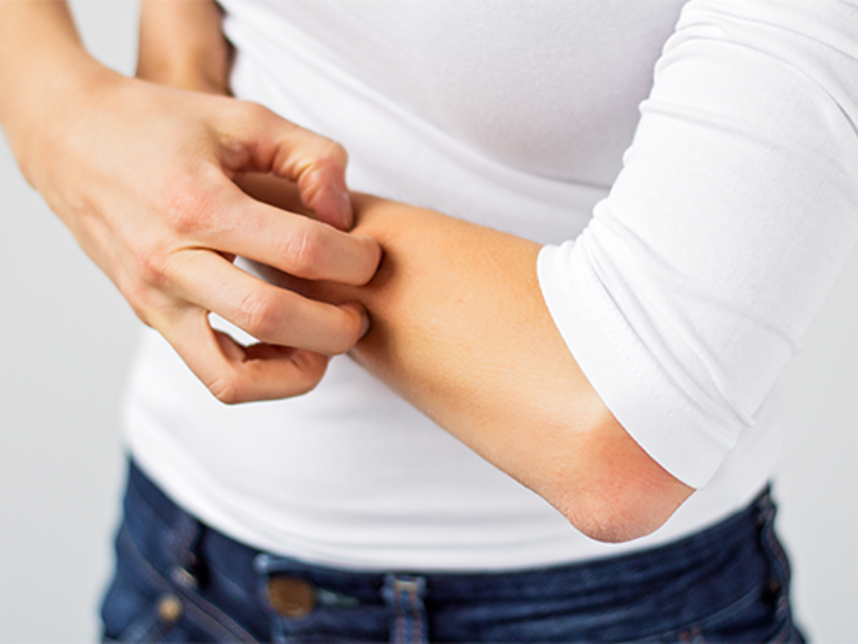One of the most common symptoms of all skin problems is itching, and for some people, it is an endless battle.

What causes the skin to itch?
Dry skin is the most common cause of itchy skin and the easiest to manage. Low air humidity, change in outdoor temperatures, sun exposure, and harsh skin care products can cause dry skin. A good daily skin care routine will help prevent dry skin.
Eczema, or atopic dermatitis, is typically the result of an overactive response of the immune system to an environmental irritant. It is a common skin condition that causes the skin to become red, itchy, and inflamed. Symptoms are different for everyone and what ‘triggers’ the symptoms may be different from one person to the next. The best way to manage eczema is to know what triggers a flare-up and then avoid it.
Seborrheic dermatitis is an inflammatory skin condition associated with over active oil glands of the body. Patches of greasy, red inflamed skin covered with flakey white or yellow scales appear on oily parts of the body, and they itch. When on the scalp, it is also known as dandruff.
Psoriasis is the result of an immune system condition that makes skin cells develop more rapidly and build up on the skin’s surface. Thick red, itchy patches covered by silvery scales form on the skin usually on joints and the hairline.
Allergic reactions can cause irritation, rashes, and itchy skin. Allergic reactions occur when the skin comes in contact with an allergen or substance that the immune system attacks. Poisonous plants, chemicals, soaps, cosmetics, pets, nickel, jewelry, and food are common triggers for an allergic reaction.
Hives are caused by the release of a chemical in the body called histamine which causes small blood vessels to leak causing the skin to swell, itch, and can be painful. Hives typically occur from an allergic reaction to food or medication, but cold weather, sun exposure, stress, or excessive exercise can also cause hives.
Insect bites can cause the skin to swell and itch. Some symptoms are apparent within minutes while others may take hours to appear.
Medical conditions can also cause uncomfortable and severe itching. Diseases such as diabetes, shingles, and uremic pruritus can cause severe itching. Fungal infections, such as athlete’s foot, can cause itchy skin between and around the toes.
Stop the itch
In all of the above conditions, scratching the itch promotes more itching. An uncontrollable sensation to scratch in order to relieve the itch, commonly called the itch-scratch cycle, can cause skin damage, promote inflammation, irritation, and potential infection. Itching is not contagious, but can be very uncomfortable, painful, and can affect daily activities.
Over-the-counter (OTC) treatments can help manage the itch, reduce irritation, and inflammation which aid in obtaining a quick recovery to healthy skin.
- Use a mild cleanser, a good moisturizer, and sunscreen that are fragrance-free and gentle to the skin. Common chemical irritants and harsh soaps can promote problems for already irritated skin.
- Medicated shampoos and cleansers that contain Pyrithione Zinc help relieve symptoms of dandruff and seborrheic dermatitis.
- Hydrocortisone, an OTC corticosteroid cream or ointment, helps reduce inflammation and controls and relieves flare-ups due to mild forms of eczema, seborrheic dermatitis, and psoriasis.
- Hydrocortisone also helps relieve itching associated with minor skin irritations, inflammation, and rashes due to allergens such as jewelry, detergents, cosmetics, soaps, and external genital and anal itching.
Always consult a dermatologist for an individual treatment plan when symptoms become unmanageable.
Ref:
http://www.medicalnewstoday.com/articles/311473.php
www.healthline.com/health/skin-disorders/dandruff-vs-dry-scalp
https://www.webmd.com/skin-problems-and-treatments/understanding-dandruff-basics
